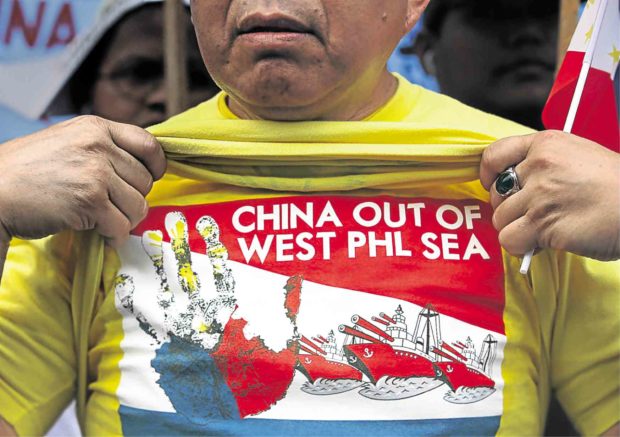
A protester stands outside the Chinese consulate in Makati City during a rally on Friday marking the third anniversary of The Hague arbitral tribunal ruling that rejected Beijing’s expansive claims in the South China Sea, in a landmark case brought by Manila in 2013. —LYN RILLON
MANILA, Philippines–Even though President Duterte is dissatisfied over China’s refusal to adhere to Manila’s 2016 arbitration victory in their South China Sea disputes, the Chief Executive won’t be giving up on asserting the country’s claims in the contested territory.
Malacañang on Thursday reassured that the Philippines is not surrendering on the issue, stressing that the country’s claim is “final, binding and unappealable.”
“Our claim, as the President said, is final, binding and unappealable. It is a question of enforcing the same. Again, the question will arise, who will enforce it; how do you enforce it. We will have to look for a mechanism how to enforce it,” presidential spokesperson Salvador Panelo said.
Pressed if this means the Philippines is not giving up on the ruling, Panelo replied: “Definitely, we’re not. I think that’s very clear from the President’s declaration.”
He made the remarks a day after the President said he was not satisfied with Chinese President Xi Jinping’s refusal to heed the arbitral ruling that favored Manila’s claims in the South China Sea.
Mr. Duterte raised the ruling in his recent bilateral meeting with Xi in Beijing, during which Xi refused to budge from China’s position that the expansive waters — which overlaps with the Philippines’ exclusive economic zone — is a Chinese territory.
Duterte has long been criticized by nationalists and left-wing groups for not immediately demanding Chinese compliance with the ruling by an arbitration tribunal in The Hague that declared China’s claims to virtually the entire South China Sea invalid under the 1982 U.N. Convention on the Law of the Sea.
The ruling also upheld the Philippines’ sovereign rights over a wide stretch of waters called the exclusive economic zone, where Chinese territorial claims have delayed for years Manila’s plan to explore and extract potential undersea deposits of oil and gas.
Panelo noted that it was good that even with the maritime dispute at an impasse, the two countries are still cooperating in some areas.
“Meanwhile, let’s talk on how this can be resolved. But to my mind, even if there is an impasse, there appears to be joint cooperation by both parties with respect to the joint exploration of oil, and that is a good sign,” he said.
The Palace said the President prefers to tackle other areas of concern where the Philippines has no conflict with China.
“What he’s saying is, the two parties agreed to peacefully negotiate for the solution of the conflict. But meanwhile, let’s go to the other areas of concern that we don’t have problems in,” Panelo said.
As to the proposed joint oil exploration between China and the Philippines, Panelo said the steering committees from both nations will still have to discuss the terms and conditions of the proposed deal.
“That has to be discussed, we don’t know yet what will the terms of reference will be,” he said when asked on the proposed 60-40 sharing deal in favor of Manila.
Told that energy secretary Alfonso Cusi is of the opinion that the 60-40 sharing deal is only applicable to contested areas and not to areas falling within the Philippines’ territorial waters, Panelo said: “If that is the position of Cusi being the alter ego of the President, unless overruled by the President, that is the policy.”
“If that is the policy of Mr. Cusi as Energy czar to limit the exploitation of certain areas, then that is the policy of the government. Unless, overruled, altered or amended by the President without prior notice. Everything is subject to change without prior notice with this President,” he added. With Associated Press
https://globalnation.inquirer.net/179693/duterte-not-satisfied-with-xi-response-on-hague-ruling

